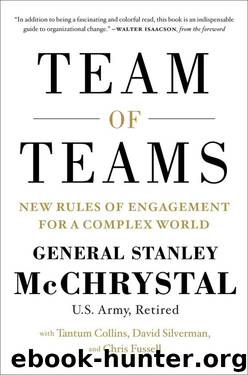Team of Teams: New Rules of Engagement for a Complex World by General Stanley McChrystal & Tantum Collins & David Silverman & Chris Fussell

Author:General Stanley McChrystal & Tantum Collins & David Silverman & Chris Fussell [McChrystal, General Stanley]
Language: eng
Format: epub, mobi
Publisher: Penguin Publishing Group
Published: 2015-05-11T22:00:00+00:00
LAUNCH TOWER OF BABEL
On the other side of the ocean, ELDO had also started out with similarly grand aspirations. Established soon after the European Coal and Steel Community—the predecessor of the EU—it represented unity between countries that had nearly destroyed one another twice in fifty years. The initiative would encourage cooperation between nations, and Western European businesses, governments, and militaries would all gain technical expertise and credibility if the mission succeeded and put objects in orbit.
In 1961 European technology and expertise were on par with those of the United States. The Germans had been the first to develop military rockets; the United Kingdom had a successful program of developing air-to-surface, surface-to-air, air-to-air, and ship-to-air weapons; Italy, France, Belgium, and the Netherlands also brought significant resources to bear. But ELDO teams worked independently, users and manufacturers communicated rarely, and each nation assumed control of a different stage of the rocket: the United Kingdom produced the booster, France the second stage, Germany the third, while Italy made the satellite test vehicle. There was no single location for project documentation, no system for providing access to other groups’ documentation, and no specifications for what documentation each entity should produce. Each country managed its part through its own national organization, and each sought to maximize its own economic advantages, which often meant withholding information. Contractors reported only to their national governments. In 1968, NASA’s international programs chief described the ELDO members’ “half-hearted and mutually-suspicious character of participation.” This competitiveness might have been a boon to a less interdependent endeavor, but it was problematic for something as linked and complex as spaceflight.
ELDO’s first launch failed because it used the wrong kind of bolts to connect the French and German stages. The next collapsed because of differences between connecting rings used by the Germans and Italians. The next attempt, in August 1967, made headway when the second stage successfully separated, but once free of the booster, it did not fire. An electrical ground fault had de-energized a relay in the first stage when the rocket was sitting on the launch pad, and this led to a failure of the second-stage sequencer. Four months later, another electrical interface issue brought down the next launch. In July 1969—a few weeks prior to the American moon launch—an interface error ignited a rocket’s self-destruct system while it sat on the launch pad. ELDO’s final launch attempt, in November 1971, blew up ninety seconds into flight. The organization was dissolved three years later.
Internal and external analyses later concluded that all these problems stemmed from shortfalls of organizational communication—devastating “interface failures,” or blinks. In his 1964 book The American Challenge, French journalist Jean-Jacques Servan-Schreiber argued that Europe’s lag behind the United States in the Space Race was not a question of money but of “methods of organization above all . . . this is not a matter of ‘brain power’ in the traditional sense of the term, but of organization, education, and training.” On the other side of the pond, Secretary of
Download
Team of Teams: New Rules of Engagement for a Complex World by General Stanley McChrystal & Tantum Collins & David Silverman & Chris Fussell.mobi
This site does not store any files on its server. We only index and link to content provided by other sites. Please contact the content providers to delete copyright contents if any and email us, we'll remove relevant links or contents immediately.
Rich Dad Poor Dad by Robert T. Kiyosaki(6613)
Bad Blood by John Carreyrou(6611)
Principles: Life and Work by Ray Dalio(6422)
Playing to Win_ How Strategy Really Works by A.G. Lafley & Roger L. Martin(6254)
Management Strategies for the Cloud Revolution: How Cloud Computing Is Transforming Business and Why You Can't Afford to Be Left Behind by Charles Babcock(4569)
The Confidence Code by Katty Kay(4251)
Thinking in Bets by Annie Duke(4218)
American Kingpin by Nick Bilton(3876)
Delivering Happiness by Tony Hsieh(3418)
Project Animal Farm: An Accidental Journey into the Secret World of Farming and the Truth About Our Food by Sonia Faruqi(3217)
The Power of Habit by Charles Duhigg(3130)
The Tyranny of Metrics by Jerry Z. Muller(3067)
The Marketing Plan Handbook: Develop Big-Picture Marketing Plans for Pennies on the Dollar by Robert W. Bly(3057)
Brotopia by Emily Chang(3050)
Mastering Bitcoin: Programming the Open Blockchain by Andreas M. Antonopoulos(3036)
I Live in the Future & Here's How It Works by Nick Bilton(2994)
The Content Trap by Bharat Anand(2917)
Building a StoryBrand by Donald Miller(2896)
Applied Empathy by Michael Ventura(2893)
